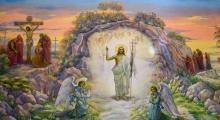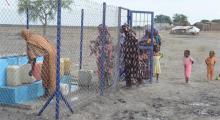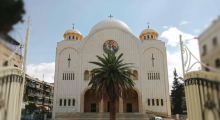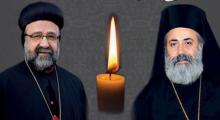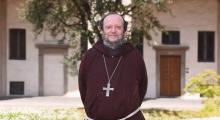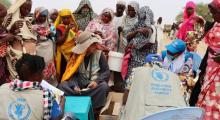Issued by the Catholic Center for Studies and Media - Jordan. Editor-in-chief Fr. Rif'at Bader - موقع أبونا abouna.org
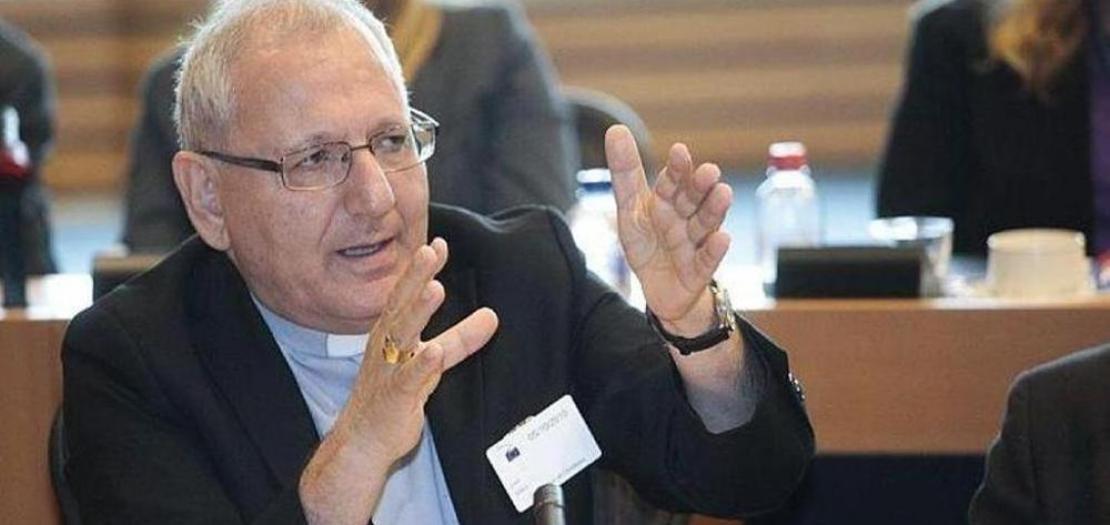
Chaldean Patriarch Louis Raphael warns: the Nineveh Plain is now a “disputed territory”.
Fundraising and the mobilization of international associations is not enough to ensure continuity to the Christian presence in the Middle East. First of all, we need political solutions able to ensure stability and interrupt the spiral of conflict and violence that continues to depredate the lives of entire peoples. Chaldean Patriarch Louis Raphael Sako, after having presided over the synod of his Church - held in Rome from 4 to 8 October - and after taking part in Pope Francis’ meeting with the heads of the Eastern Catholic Churches, outlines the far-from-reassuring factors weighing on the future of Iraqi Christians, with the Nineveh’s Plain that could find itself at the center of a new military clash between Baghdad and the independist government of Kurdistan.
At the same time, the Primate of the Chaldean Church reiterates that the permanence of Christians in the Middle East is a matter that depends on faith rather than on political strategies, “Like the Pope, we Christians see that faith is our only strength. We have nothing else”.
The defeat of the Jihadists in Daesh does not seem to guarantee peace in Iraq. This also affects the situation of local Christian communities. What road should be followed?
“In the Middle East, we need political solutions. We do not just need for temporary financial aid and donations. People are tired of passing from one war to another, they want stability, they want to live together in security, freedom and dignity. But the West is not interested in this. And there is nothing behind the slogans on freedom and democracy.”
Why does the West struggle in understanding Middle East dynamics?
“There are two mentalities. The West’s new religion is practical atheism. A spiritual emptiness is perceived, and so many Christians also appear lukewarm. Opposite to this there is political Islam, in which religion identifies itself and merges with politics, it is actually absorbed by politics. Muslims must understand that the world has changed, that Islam is not the only religion in the Middle East and the only way to promote cohabitation and progress is a civil government based on the principle of equal citizenship for all.”
There are those who thought they would solve everything by “exporting” democracy with wars.
“Freedom and democracy in politics are acquired by accompanying people in long-term training processes. But the political leaders of our countries often only pursue their personal interests of power and money, which are short-lived. We do not understand where we are going, we only understand that it is always the poor and the innocent who pay. As soon as the occupation of the Islamic State ended, a new front of great tension and uncertainty was opened with the referendum called by Iraqi Kurdistan to proclaim its independence”.
How do you stand before the Kurdish question?
“There are 5 million Kurds in Iraq, but there are 40 million Kurds in the region, divided between Iraq, Iran, Syria and Turkey. In principle, they have the right to have their own state, but this must be prepared and negotiated taking into account contexts and moments, by negotiating with governments and the international community, and certainly not through fait accompli politics and unilateral decisions”.
Did Christians support the referendum?
“Some of those in Kurdistan supported the referendum. They think their future is there. It is their right. Many others appear to be against it.”
What are the problems and risks?
“An unresolved problem is that of the so-called disputed areas, among which there is Kirkuk and the Nineveh Plain, the historical homeland of many Christian communities. This is a problem that had to be solved earlier. We, as the Church, have always invited the parties to engage in dialogue. We fear that the “wall against wall” strategy will end up creating the conditions for a new conflict, which would be wearing and catastrophic”.
Is there a danger that the situation will degenerate?
“Tension is already quite high”.
Did the Christians of the Nineveh Plain really participate in the referendum? And how many?
“In my opinion, not many. The Nineveh Plain is now a divided territory, due to the way in which the liberation from the Jihadists of Daesh took place. The northern part has been liberated by the Kurds Peshmerga, and is now under their military control. While the southern part is controlled by the Iraqi army and popular mobilization forces, mostly Shiite. The situation is delicate, the balances are extremely fragile”.
The Kurdistan Referendum Committee has promised Christians autonomy in the Nineveh Plain. A promise that revives the ancient dream of creating a protected autonomy area for Christians there. What do you think about it?
“We are accustomed to promises coming from all sides, both by the central government and by the Kurdistan regional government. We need to learn history’s lessons. It is not wise to trust blindly or sentimentally those who make unrealistic promises. Also because they are not humanitarian agencies. If they promise something, they do so because it is part of their political plans.”
Is there any money-trafficking to get Christian organization’s support for the independence of Kurdistan?
“Most of Christian parties receive grants, even from influential people who are in contact with the Kurdish regional government. Sarkis Aghajan Mamendo, Assyrian Christian, and former Minister of Finance of the Autonomous Region of Kurdistan, continues to play an important role in this, who in the past has directed several funds to finance projects supported by the Christian communities and ecclesial hierarchies in Iraq.”
You too have been attacked by some of the Christian political militants belonging to those small parties. They accused you of interfering too much in political matters.
“The Church has no desire of engaging in politics. But in this vacuum, we are experiencing, and with the total lack of reference points, we must say a word of justice and wisdom to the many people who ask for it. They come to us because they don’t have others to turn to, they ask us for help in finding a job, or ask us to help them find their relatives who have been kidnapped.”
The Kurds are also divided among themselves.
“This also contributes to this over-all uncertainty. In Kurdistan, there are political forces that are against its independence. And I fear that the division between those who are pro-independence and those against it will be further worsened by the embargo against Kurdistan. International flights to Erbil have already been cancelled. If the economic situation becomes more complicated, where will they find the money to pay salaries to military, public and civil servants?”
At the international level, so far, no one has recognized the independence of Kurdistan.
“Yet there are many “double messages” circulating. The French President said that he was not against it. The Canadians have expressed their support. The Americans have placed their advisers and certain congressmen in Kurdistan. And then there is Israel’s favorable position...”
Many International organizations as well as many leaders and politicians say they want to help Christians. But they seem to entrust the fate of Christians only to geopolitical relations of power and to the mobilizations and pressures organized from outside.
“The Pope, when he met the leaders of the Eastern Catholic Churches, repeated that Christians in the Middle East are victims of a “piecemeal world war” waged by the devil. And he told everyone to entrust ourselves to prayer and the Gospel to ask that the Christian presence in our lands be guarded. He did not mention any instrument of power or of political or geopolitical pressure. The permanence of Christians in the Middle East is a matter that depends on faith and missionary spirit, rather than on political strategies. Like Pope Francis, we Christians see that our only strength is our faith. We have nothing else. Only faith can make understand that the Christian presence has a mission in the Middle East: we are called to show others that there is another way of living and acting. Many of our fellow Muslim citizens appreciate us for the way we live in the family, for our loyalty, for our works, such as schools. They recognize that our presence makes a positive and indispensable contribution to coexistence in our societies, in the historical forms in which this presence has expressed itself. For this reason, those who really want to help us must encourage this sympathy for Christians, and must not separate or even oppose Christians from their fellow Muslim citizens and other religions. This could be very dangerous.”
In the past, you have denounced that some Western countries were favoring the emigration of Middle Eastern Christians and in this way helped to empty the Middle East of Christians. But a few days ago, some Christian refugees in Lebanon organized a rally, accusing the leaders of their Churches of holding back and sabotaging their requests for expatriation to the West, for fear of losing faithful. Is that really the case?
“Absolutely not. We have never asked directly or indirectly or even unofficially not to give visas to Christians who want to expatriate. To leave or stay away is a personal decision, to be made in conscience, and this decision must be respected. But I, as Patriarch, certainly cannot promote or support the massive emigration of Middle Eastern Christians. In addition, the Church must be more deeply committed to the pastoral care of its faithful who emigrate, so that all the spiritual wealth linked to its belonging to the Church of origin may not be dissipated in a short time”.
In this regard, the pope said that the Church is not Latin or Slavic or Byzantine, but is “Catholic”. Is the spiritual richness of the Catholic Churches of the East being valued or neglected as an instrument for making people perceive the Catholicity of the Church?
“We are all part of the universal Catholic Church, but this belonging does not mean homologation to the forms and dynamics of the Western Latin Church. Diversity in the communion of those who belong to the same Church is a richness, and we need each other.”
Is the return of Christian refugees to their homes in the Nineveh Plain really heavy, as some say, also to show the importance of their own supporting initiatives, or is it very small, as other observers say?
“Offers alone are not enough to promote the return of displaced persons, it is also necessary to rebuild and develop the destroyed infrastructure, the schools... But above all, it must be acknowledged that the uncertainty over the future of the Nineveh Plain and the risk of a new conflict between the government army and the Peshmerga induces many of them to wait, to take time. They are waiting to see how it will end. I hope that dialogue will prevail, not chaos and weapons that kill and destroy everything.”


